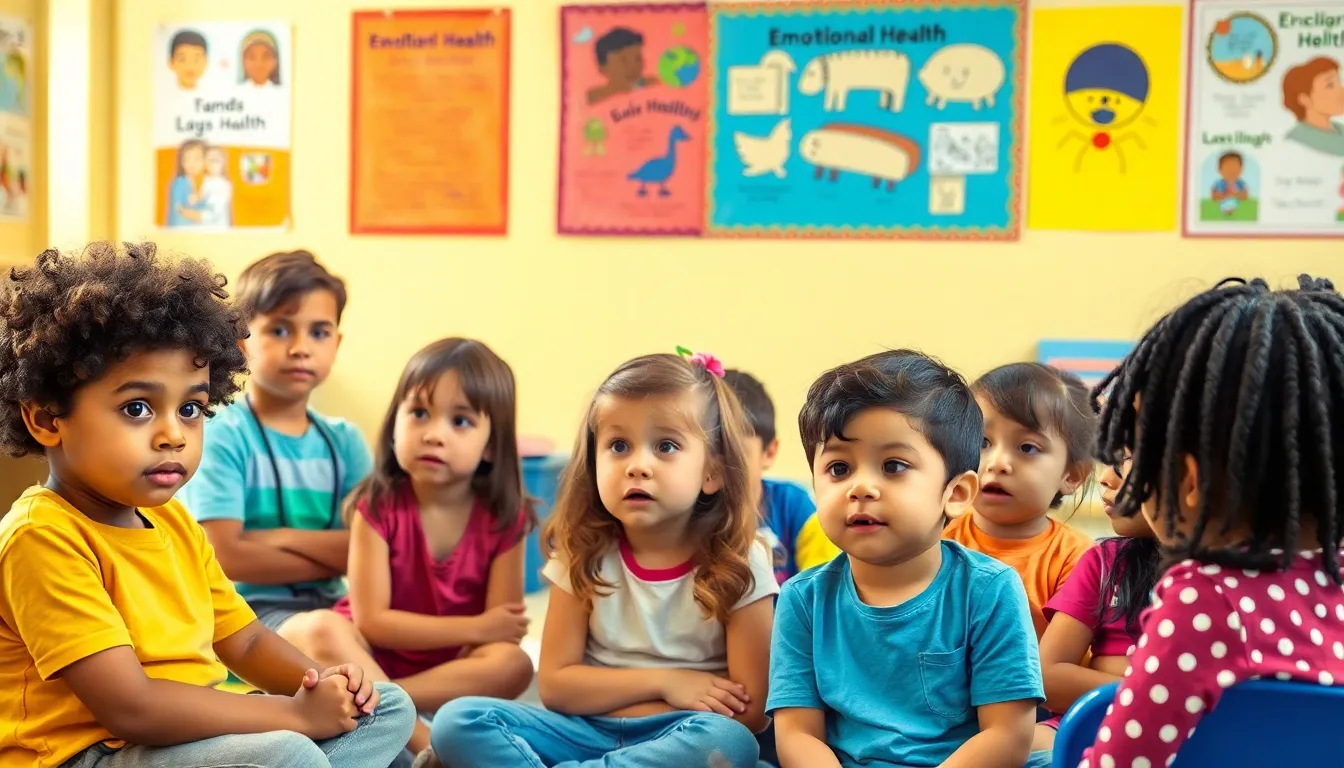Emotional health in children isn’t just a buzzword—it’s the secret sauce to raising happy, well-adjusted little humans. Think of it as the invisible superhero cape that helps kids navigate life’s ups and downs. Without it, they might just end up as emotional spaghetti—tangled and messy!
Table of Contents
ToggleImportance Of Children Emotional Health
Emotional health in children plays a significant role in their overall development and well-being. It enables children to navigate life’s challenges and build strong relationships.
Impact On Development
Emotional health influences cognitive abilities, social skills, and behavioral patterns in children. Emotional stability fosters resilience, allowing them to cope with stress and adversity. Healthy emotional development encourages empathy, improving their ability to connect with peers. A strong emotional foundation correlates with academic achievement, as children who feel secure are more engaged in learning. Additionally, it shapes their ability to express feelings and understand those of others, critical skills for interpersonal relationships.
Long-Term Effects
The long-term effects of poor emotional health manifest in adulthood. Adults with unresolved emotional issues often face challenges in relationships, career stability, and mental health. Research indicates that emotional difficulties in childhood can lead to an increased risk of anxiety and depression later in life. Self-destructive behaviors may also arise as coping mechanisms for unresolved feelings. Maintaining emotional health in childhood is essential for building a balanced and fulfilling life. Positive emotional experiences lay the groundwork for lifelong well-being and success.
Common Emotional Issues In Children

Children often face various emotional issues, significantly impacting their overall well-being and development. Understanding these challenges allows parents and caregivers to provide the necessary support.
Anxiety Disorders
Anxiety disorders are prevalent among children. These conditions can manifest through excessive worry about school performance, social interactions, or potential dangers. Symptoms often include irritability, restlessness, and physical complaints such as headaches or stomachaches. Children may avoid specific situations or experiences, leading to isolation. Early identification of anxiety is essential as untreated symptoms can escalate, affecting academic performance and social relationships. Engaging with mental health professionals helps in developing coping strategies, ensuring children manage their fears effectively.
Depression
Depression in children can be subtle yet profoundly impactful. Feelings of sadness or hopelessness persist in many cases, affecting motivation and interest in activities once enjoyed. Changes in sleep patterns, appetite, and energy levels often accompany depressive symptoms. Academic performance typically declines when children experience persistent low moods. Making space for open conversations about feelings encourages children to express themselves. Accessing professional help for proper diagnosis and treatment promotes recovery and emotional resilience. Recognizing depression early leads to better long-term outcomes for children, ensuring a healthier emotional future.
Signs Of Emotional Health Issues
Recognizing signs of emotional health issues in children is crucial for timely intervention. These signs can manifest in various behavioral and emotional ways.
Behavioral Indicators
Behavioral changes often signal emotional distress. A child may exhibit increased irritability or mood swings. Withdrawal from friends or family can indicate trouble. Sudden declines in academic performance often accompany emotional struggles. Additionally, signs like excessive tantrums or protests about school reveal underlying challenges. These behaviors may also include changes in sleep patterns or appetite, such as insomnia or overeating. Monitoring these indicators helps parents identify when professional support may become necessary.
Emotional Indicators
Emotional signs can also provide insights into a child’s mental state. Feelings of sadness or an overwhelming sense of hopelessness may surface. Regular expressions of anxiety, especially related to social situations or school, warrant attention. Frequent tearfulness might indicate deep emotional turmoil. Children may also show signs of fearfulness, avoiding activities they once enjoyed. Changes in self-esteem, such as feelings of worthlessness, can signal significant emotional issues. Fostering open discussions about these emotions promotes understanding and helps parents address concerns effectively.
Strategies To Support Emotional Health
Supporting children’s emotional health requires effective strategies. Parents and educators can play significant roles through various methods.
Positive Parenting Techniques
Positive parenting techniques foster healthy emotional development. Parents can encourage open communication, providing a safe space for children to express feelings. Practicing active listening helps children feel valued. Using praise to acknowledge efforts reinforces positive behavior. Creating routines offers stability, while modeling emotional regulation teaches coping skills. Engaging in quality time strengthens bonds, building a sense of security and trust.
School-Based Programs
School-based programs target emotional health through structured activities. Schools can implement social-emotional learning (SEL) curricula that teach empathy and problem-solving skills. Regular workshops on emotional awareness equip students with tools to manage stress and anxiety. Trained counselors provide support for students facing challenges. Peer mentoring programs promote positive interactions, enhancing social skills. Incorporating mindfulness practices encourages self-reflection and emotional regulation, benefiting the entire school community.
Resources For Parents And Caregivers
Parents and caregivers play a pivotal role in supporting children’s emotional health. Accessing relevant resources can greatly enhance their ability to provide effective guidance.
Books And Articles
Numerous books and articles address children’s emotional health. “The Whole-Brain Child” by Daniel J. Siegel offers insights into brain development and practical strategies for nurturing emotional growth. “Raising An Emotionally Intelligent Child” by John Gottman emphasizes the importance of emotional awareness and provides techniques to foster children’s self-regulation. Additionally, articles on websites like the Child Mind Institute and American Academy of Pediatrics present evidence-based advice. Engaging with literature increases understanding of emotional issues and equips parents and caregivers with necessary tools for meaningful conversations and interventions.
Professional Support Services
Accessing professional support services can significantly benefit children’s emotional well-being. Psychologists and counselors specialize in diagnosing emotional disorders and developing tailored treatment plans. School-based mental health services offer convenient options for support during school hours. Community organizations often provide workshops on emotional health and parenting strategies. Utilizing hotlines or online therapy platforms ensures immediate access to emotional support when needed. Collaborating with professionals empowers caregivers to implement effective strategies tailored to their child’s unique experiences and needs.
Children’s emotional health is a cornerstone for their overall development and future success. By prioritizing emotional well-being, parents and caregivers can equip children with the tools they need to face life’s challenges. Recognizing signs of emotional distress and fostering open communication create a supportive environment where children can thrive.
Implementing positive parenting strategies and seeking professional help when necessary can significantly enhance a child’s emotional resilience. Investing time in quality relationships and utilizing available resources, such as insightful literature and school programs, further strengthens this foundation. Ultimately, nurturing emotional health not only benefits children in their formative years but also lays the groundwork for a fulfilling and balanced life.




